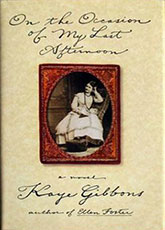On the Occasion of My Last Afternoon
Critique • Quotes
 First edition
First editionFirst publication
1998
Literature form
Novel
Genres
Literary
Writing language
English
Author's country
United States
Length
Approx. 73,000 words
In the last analysis, a happy occasion
On the Occasion of My Last Afternoon is the one Kaye Gibbons novel about which some critics might be right when they say she's preachy. The story does seem to stop for long stretches to let her good characters make their points, or to chastise the bad characters. And it does seem that the good characters are just overwhelmingly so good and the bad so very bad.
On the good side are the narrator, Emma Garnet Tate and, from partway through, her husband Dr. Quincy Lowell, who together oppose ill treatment of slaves in the southern United States before the Civil War and spend the war caring for wounded soldiers.
Also too good to be true is Clarice, the black woman who devotes her life first to Emma's father and his family and then to Emma and Quincy's own family.
On the bad side, as representative of all that was evil in the old South, is Emma's father—a rich, powerful, racist tyrant. Emma, supported by Clarice and later Quincy, is the only member of the family to stand up to him. His wife, also one of the good people, suffers his abuse because she thinks he really does love and need her (probably true). A son dies horribly. Other sons get as far away as they can as soon as they can and another daughter ruins her chances for a happy life by submitting to her father's will.
Preaching to this choir
A surprise comes however late in the novel, when Clarice reveals what made the father turn out the way he did. And when we discover that perhaps Emma hasn't been as benevolent toward her slaves as we thought.
But critics may say this complexity is introduced too late to affect our shading of the characters. Unlike Gibbons's tough earlier novels of Ellen Foster and A Virtuous Woman, this one presents sentimentalized characters.
To which at least two responses can be made. One: the story is told in the first person by Emma herself as she is peacefully dying—it is quite realistic to suppose she would be the hero of her own story (although she is also honest about her own failings) and the characters as she recalls them at that point in her life would be painted by memory in broad strokes.
Two: yes, On the Occasion of My Last Afternoon may be more simplistic and preachy than it has to be and, yes, maybe the story suffers for this—but it is a good preachiness. Which is to say the preaching is compatible with my own proclivities. I really did get angry and upset at the bastards in the novel and fell in love with the kind-hearted characters.
And there is a lot else going on in this novel apart from the fight between good and bad. Gibbons writes so seemingly effortlessly that you don't always notice all the small touches, any more than you notice the details of the reality that surrounds you. The world she creates is so real, you take it for granted.
And that's probably the way she wants it.
— Eric
Critique • Quotes

